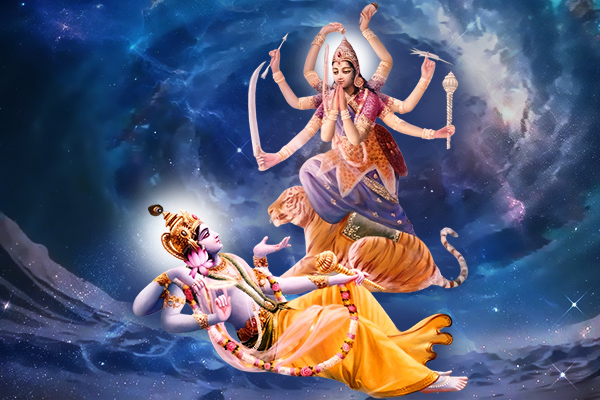
The Hindu Lunar calendar is divided into two different cycles/phases of the Moon. One phase is that of the waxing Moon which is known as 'Shukla Paksha', in which phase the Moon grows (visually) and brightness everyday bit by bit and the other phase is that of the waning moon, Krishna Paksha, when the brightness of Moon diminishes in size everyday post the Full Moon. Each phase is 15 days respectively. 'Ekadashi' is the eleventh (11th) day in each phase of the Moon, which means that there are two Ekadashis in a month. The term Ekadashi means the eleventh lunar day (Tithi) in each fortnight of the Shukla Paksha and the Krishna Paksha respectively.
To further explain the term 'Tithi' (as per the Hindu calendar), it means one Lunar day which means the time it takes for the Moon to travel a certain distance. So, Ekadashi is the 11th Lunar day or Tithi. In the Shukla Paksha i.e. the brighter phase of the Moon, on Ekadashi, the Moon looks three fourth (3/4th) and in the Krishna Paksha Ekadashi, the Moon appears three fourth (3/4th) dark. There are 24 Ekadashis in a year, except for Leap year when there are 26 Ekadashis.
Along with Hinduism, Jainism too considers Ekadashis to be holy, which has spiritual connotations. It is said that merely by hearing the names of the various Ekadashis one will be free of all sins. Bhagwan Vishnu is worshipped on Ekadashi. The day is observed by fasting from Sunrise of Ekadashi Tithi to the sunrise of the following day. Fasting on the Ekadashi is an important ritual of this day. The best form of fasting for Ekadashi is to go without water or food. People who do not want to keep a full fast are recommended to have a fruit-based diet (Phalahar) or fruit and Milk/milk product diet. Consumption of Rice, Grains and Beans are prohibited on this day.
According to the ancient texts both the Ekadashis, whether in Shukla Paksha or Krishna Paksha, are equally holy and auspicious as they have the same Tithi.
Utpanna Ekadashi: Date, Time and Muhurat
According to the Hindu Lunar calendar, the Utpanna Ekadashi is in the waning Moon phase or Krishna Paksha, in the early part of winter, Margasirsha/ Margasira month which falls in November-December.
Utpanna Ekadashi 2026 Date
Utpanna Ekadashi on Friday, December 4, 2026
On 5 th Dec, Parana Time - 06:58 AM to 09:10 AM
On Parana Day Dwadashi End Moment - 12:51 AM, Dec 06
Ekadashi Tithi Begins - 11:03 PM on Dec 03, 2026
Ekadashi Tithi Ends - 11:44 PM on Dec 04, 2026
Puja Rituals: What to do on Utpanna Ekadashi?
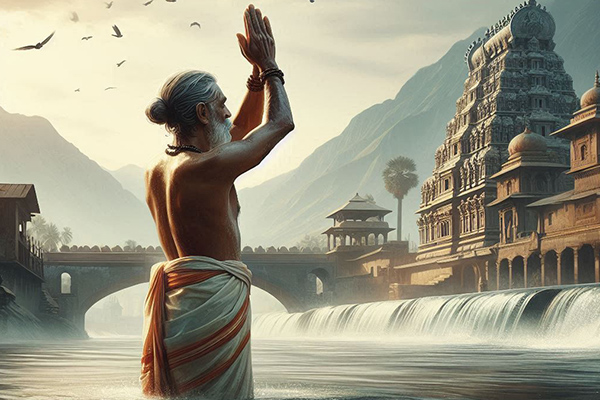
The rituals of Utpanna Ekadashi are specified in the ancient Hindu texts and are said to have been specified by Bhagwan Sri Krishna while answering Yudhishthira's (one of the Pandava brothers from Mahabharata) query. The rituals are:
One day before Utpanna Ekadashi, which is the 10th day of the Krishna Paksha, the person should clean his/her teeth thoroughly in the afternoon and have supper at Sunset hour.
On the morning of Utpanna Ekadashi, the person should be intent on keeping the fast meticulously. The person should have a bath in a river (which is said to be the most purifying) or a lake and, in both not being available, bathe in pond water.
While bathing the person should smear mud on his/her body while chanting a prayer to Mother Earth. The prayer - O Asvakrante! O Rathakrante! O Vishnukrante! O Vasundhare! O Mrttike! (O Mother Earth! please remove all my sins accumulated from past lives so that I may enter the abode of the Bhagwan Vishnu the Supreme Bhagwan)
Worship Bhagwan Govinda with complete dedication and offer an excellent 'Bhog' (food to Divine) along with flowers and other things of the offering.
Light a lamp at home in honor of the Bhagwan
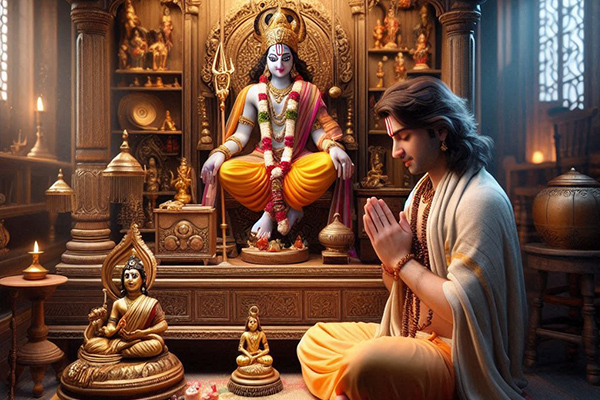
Chant or sing praises of Bhagwan Vishnu throughout the day and remain in a most blissful state during the fast.
Stay awake through the night in full consciousness. If possible, play musical instruments throughout the night to please the Bhagwan.
The next morning the person should give charity to Brahmanas and respectfully ask them for forgiveness for any offence.
For people who keep a complete fast till the next day, one should say the prayer - 'O Pundarikaksha, O lotus-eyed Bhagwan, now I will eat. Please shelter me'.
After the prayer the devotee should offer flowers and water at the lotus feet of Bhagwan Vishnu and request the Bhagwan to eat by chanting the mantra of eight-syllable, thrice. To garner the full merits of the fast, the devotee should have water which has been offered to the Bhagwan.
Fire sacrifices can be performed if the devotee chooses to do so.
The day of Ekadashi till the next morning, the devotees should take baths, sing and chant praises of the Bhagwan and worship Him with complete devotion, involve activities of devotion and charity.
Utpanna Ekadashi Vrat Katha (Story)
---Demon-Mura.jpg)
The narration says that once in Satya-Yuga there was a ferocious demon called Mura who was very violent and angry. He terrorized the Demigods and defeated Indra Dev (King of Heaven), the Sun God (also known as Vivasvan), Agni (Fire God), Vayu (God of Wind), the eight Vasus and Bhagwan Brahma.
In this situation, Indra Dev approached Bhagwan Shiva who asked them to go to Bhagwan Vishnu, the preserver of all creation and ask for the solution.
Indra Dev and the other Gods narrated to Bhagwan Vishnu about the demon Mura, their plight and how they have all lost their Heavenly position and with folded hands pleaded with Bhagwan Vishnu to save them and kill Mura. Bhagwan Vishnu acted immediately and asked them all to proceed to the demon Mura's capital city, Chandravati, where the demon resided.
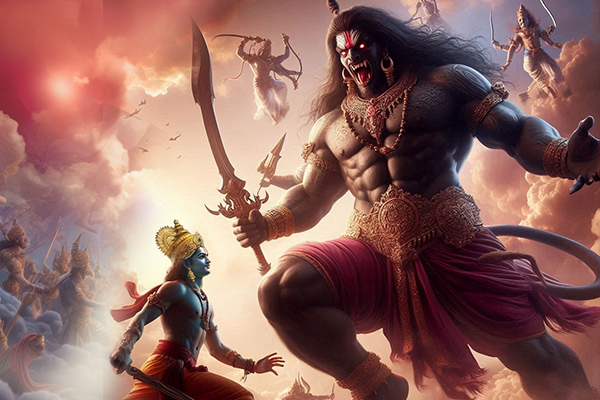
At Chandravati, the roaring demons attacked the Demigods fiercely with their shining weapons. The attack was so severe that the Demigods could not resist it and took flight from the battlefield. Seeing Bhagwan Hrishikesha/Vishnu, the demons raised their weapons and charged to attack Him. Bhagwan Vishnu pierced their limbs with His poisonous arrows, thereby putting an end to hundreds of demons in one strike.
Then Mura came face to face with Bhagwan Vishnu. All the Bhagwan's weapons failed to have any effect on Mura, who had mystical powers to protect him. Seeing His weapons failing, Bhagwan Vishnu decided to wrestle with Mura, this wrestling is said to have continued for one thousand celestial years, but Mura could not be killed or defeated.
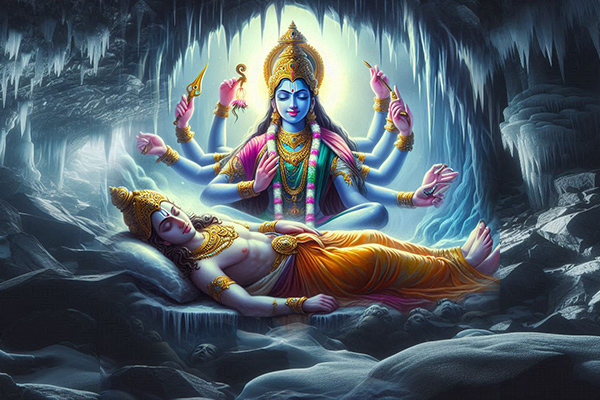
It is said that Bhagwan Vishnu was tired and fatigued by this time and left for Badarikashrama, where He found a cave which was called Himavati. The cave had only one entrance and was ninety-six miles in diameter. Bhagwan Vishnu fell asleep in the cave, but the demon Mura found Him out and thought He would kill the sleeping Hari (Bhagwan Vishnu). Mura was all prepared to take action but precisely at that time from Vishnuji's body, a young girl manifested with many shining weapons and a bright complexion. She challenged Mura to fight with Her. Mura was astonished to see how powerfully and deftly the girl fought him and wondered whose creation She was? The radiant young girl shattered all weapons of Mura in a surprise strike and before the demon could gather his wits, she had taken away his chariot. Without any weapon left, Mura charged towards Her intending to kill Her with his bare hands. Seeing Mura charging towards Her, with one clean sweep She beheaded Mura, putting an end to the evil demon.
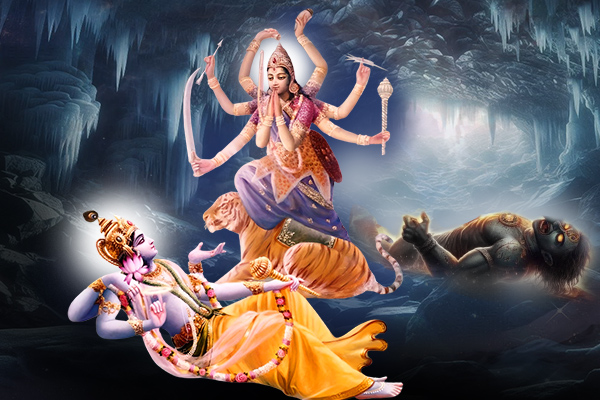
When Bhagwan Vishnu woke up from His sleep, He was surprised to see the maiden bowing down to Him with folded hands and the demon lying dead. Bhagwan Vishnu asked Her who had killed the demon, to which She replied saying She did, as Mura wanted to kill the Bhagwan while He was asleep. The Bhagwan expressed His surprise at Her power and asked Her who she was. The young girl then revealed that She was a manifestation of His transcendental self, and was Maha-Shakti, the Bhagwan's immense internal power. Bhagwan Vishnu was extremely pleased with this form of Shakti and requested her to ask for any boon.
The maiden then asked the Bhagwan for a boon which was that any human being who keeps a fast on that day of Her first appearance, his/her sins will be absolved. That if the person fasts through the day abstaining from eating anything or drinking water, with control on all senses and urges, then that person should be bestowed with the blessings of gaining a place in Bhagwan Vishnu's abode for one billion Kalpas after the person has led a prosperous, happy and abundant life. The one who would have a meal in the evening, without the inclusion of grains or beans, should be granted half the credit for the merits of keeping the fast for the day. The one who has a midday meal should be granted half of the advantage of the previous. Also, the maiden requested the Bhagwan to grant anyone who fasts that day, whether in full or by having a midday or evening meal, blessings of spiritual and religious qualities, wealth and salvation.
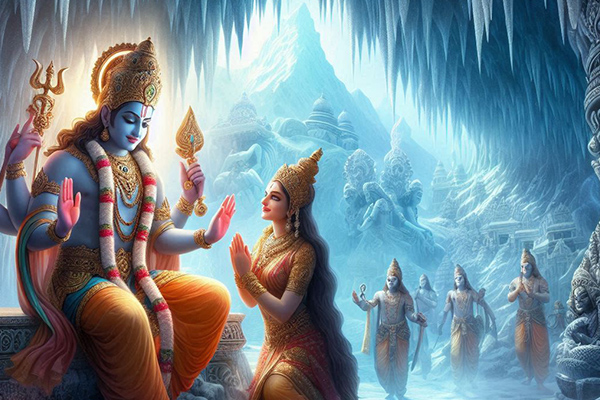
Bhagwan Vishnu readily agreed to bless the young girl with the boon she had asked for by saying that all His devotees who keep fast on the day that the young girl had appeared will be blessed with the merits. The Bhagwan also named the young maiden Ekadashi, whose first appearance was on the eleventh day of the waning Moon. The Bhagwan promised that the sins of the person will be absolved if he/she fasts on Ekadashi and will ultimately get a place in His transcendental abode. Bhagwan Vishnu also specified that along with His other favorite days of the waxing and waning Moon, like the Ashtami (eighth day), Tritiya (third day) etc., Ekadashi will also be included and fasting on Ekadashi will bring the blessings more than any other fasts or sacrifices made.
Fasting Rules for Utpanna Ekadashi
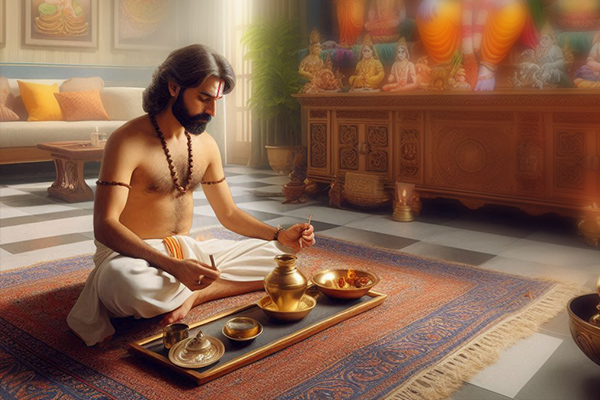
As per specifications in the ancient texts, to get the benefits of the fasting on Ekadashi the person should adhere to the rules strictly.
The devotee observing fast should have a bath on the morning of Utpanna Ekadashi.
Beans and grains are prohibited to eat on Ekadashi.
The killing of any animal is prohibited on this day for the devotee.
Sleeping during the day is not allowed on Ekadashi and the next day is on Dwadashi.
The devotee keeping fast should not meet or interact with any cheats, frauds or people involved in any nefarious activity. The scriptures even say that if by chance the devotee comes into proximity of such a person then one should purify by standing under the sun and looking directly at it.
Abstinence from sex on Ekadashi and Dwadashi.
On Dwadashi (the day after Ekadashi), devotees are not to eat in another person's house, have only one meal, Honey and Urad-dal (black lentil) are not to be consumed, eating on Bell metal plate or cutlery, and should not massage oil on the body.
As per the ancient text, if the devotee has to speak to a person from the lower caste, then he/she will have to purify himself by eating Tulsi leaves or an Amalaki fruit.
If due to any reason the devotee is not able to break the fast on the next day, then he/she should have water to signify the completion of the fast and later have food when convenient.
Utpanna Ekadashi Benefits
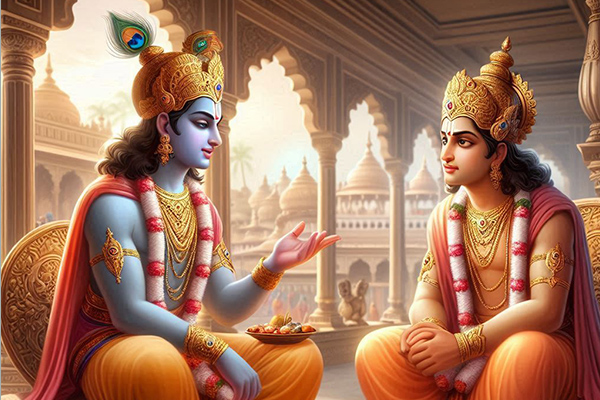
In Uttara Purana, the importance of fasting on this Ekadashi has been mentioned clearly. The ancient text has Bhagwan Krishna explaining to Yudhisthira about the importance where the Bhagwan has said it is greater than all sacrifices or charity to the needy or the sacrifice of Horses (Ashvamedha) or even seeing Bhagwan Vishnu Himself. It is said that one who observes fast on this day, adhering to the rules, will be liberated and get a place in Bhagwan Vishnu's abode.
When Yudhisthira asks Bhagwan Krishna how fasting on Ekadashi can be so significant that it surpasses the best of acts by human beings, the Bhagwan narrates the story of Utpanna Ekadashi and its significance.
Utpanna Ekadashi Daan (Donation):
Donation on Utpanna Ekadashi is considered highly auspicious and commendable. Here are some suggested items to donate on this sacred day:
.jpg)
Food items:
- Rice, wheat, and other grains.
- Fruits and vegetables.
- Cooked meals to the needy and hungry.
Click Here to Book Food Donation (Ann Daan)
Clothing:
- New clothes for the poor and underprivileged.
- Warm clothes, blankets, and shawls, especially in cold areas or winter seasons.
Click Here to Book Clothes Donation (Vastra Daan)
Money and benefaction:
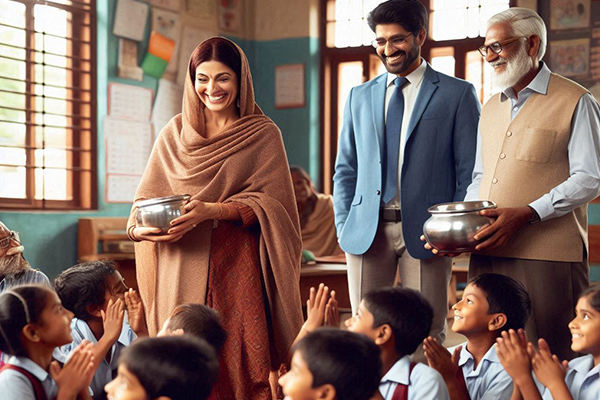
- Financial donations to temples, charitable organisations, or directly to those in need.
- Supporting the education of underprivileged children by donating to schools or educational charities.
Religious Items:
- Books on spirituality and religious scriptures.
- Items used in worship like incense sticks, diyas (lamps).
Shelter and Support:
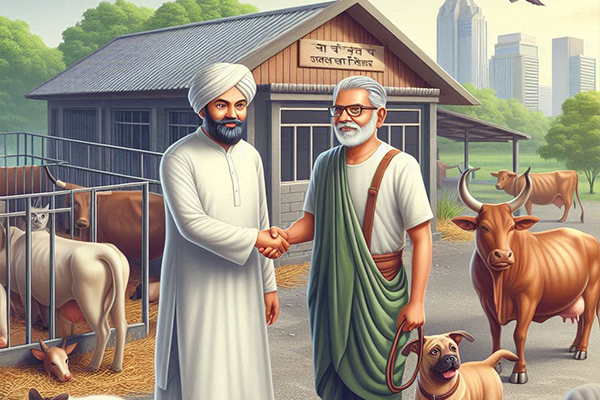
- Donating to shelters for the homeless or animal shelters.
- Contributing to the construction of schools, hospitals, and community centres.
Cows and Animal Care:
- Donating to goshala (cow shelters) or animal welfare organisations.
- Providing food & fodder and other essentials for animals.
.jpg)

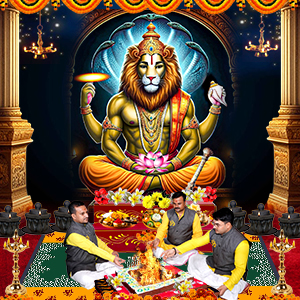
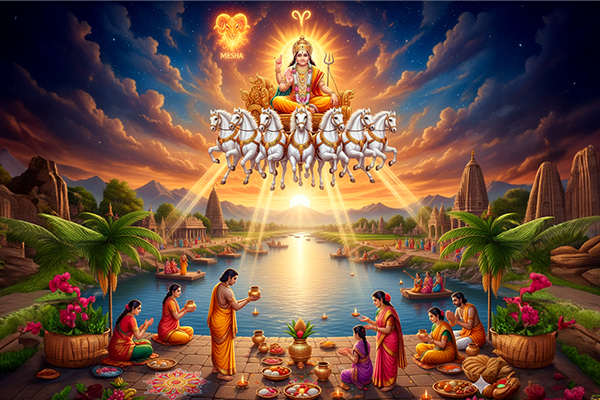
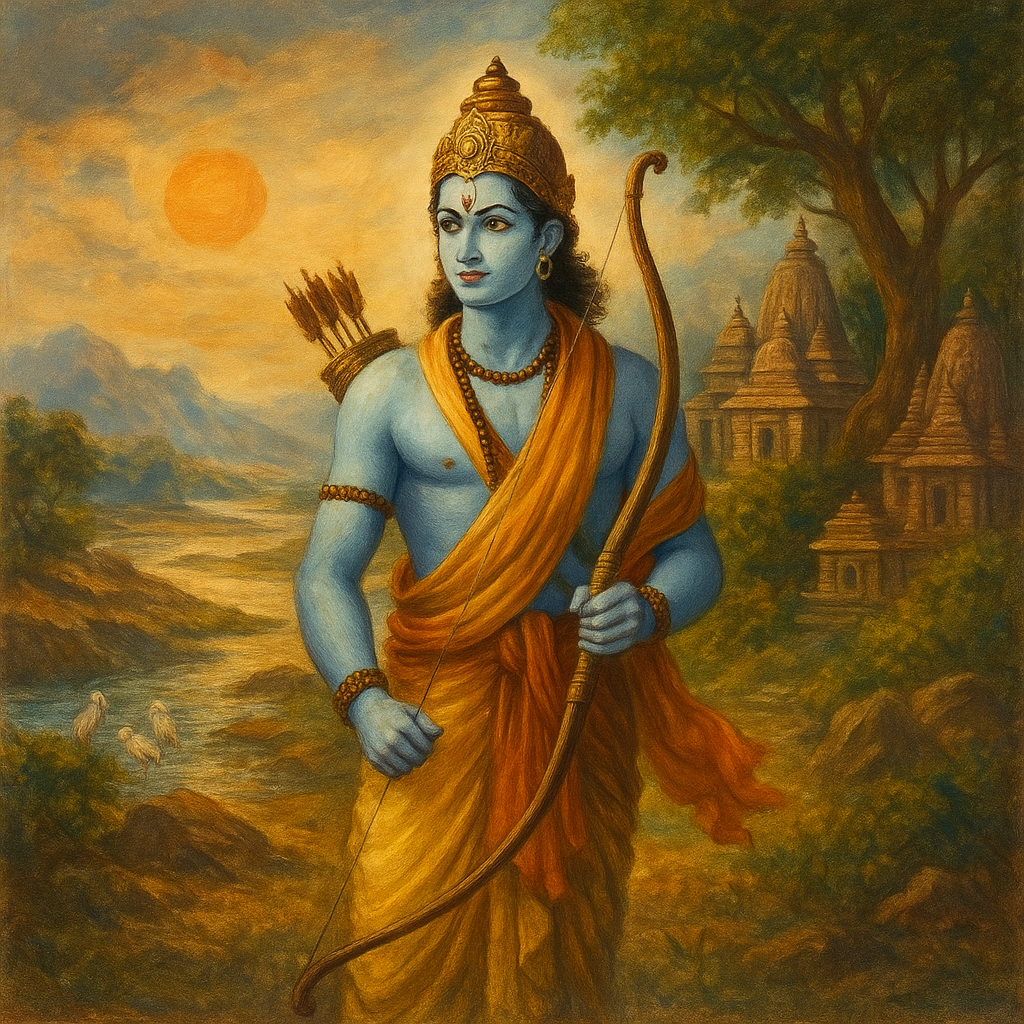
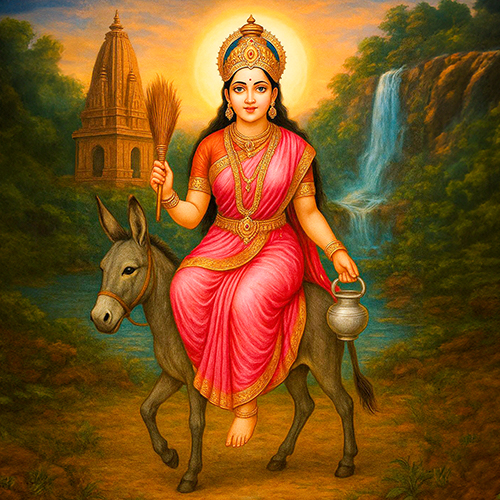
Comments 0
Leave your thought here